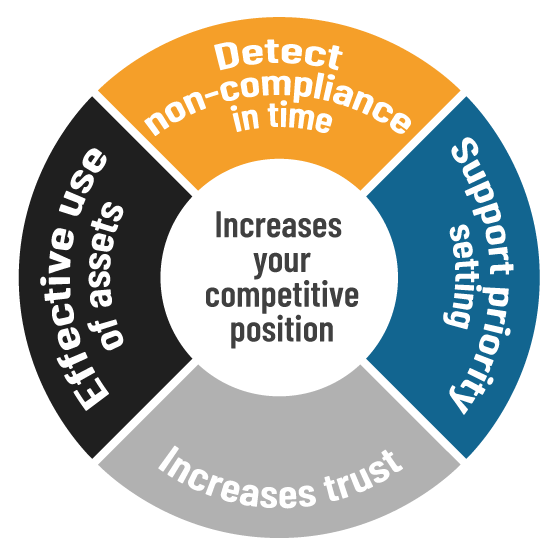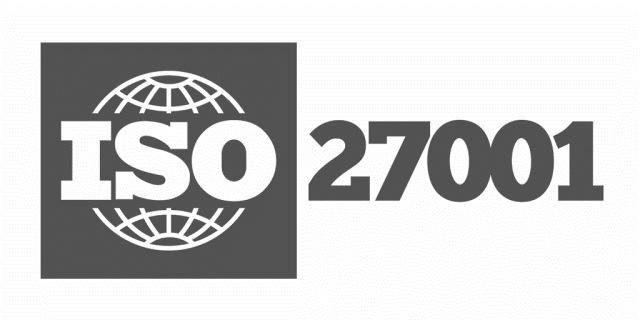Compliance
& Audits
What is compliance and auditing?
Compliance includes all activities to ensure your organisation complies with a certain (inter)national standard (e.g. ISO 27001 / ISO 22301) or legislation and regulations.
Auditing is the verification of all measures taken by your organisation on their design, existence and (effective) functioning. An audit is carried out by an independent party, using the standard against which you wish to be verified as a reference.
At your request, an audit can be carried out on (a part of) your own organisation or on e.g. a supplier important to your organisation. An audit can be carried out once or periodically and is intended to provide objective insight into the correct observance of the internal policy and/or contractual agreements.
An audit has added value for your organisation if the person carrying out the audit (the auditor) has knowledge of both the standard (the theoretical reference framework) and the practical application of this standard (experience, industry best practices).
Objectives of
Compliance and Audits
- Independent examination of whether the organisation in scope complies with its own internal policy, or whether agreements made between two parties are correctly implemented.
- With an independent audit, you show to stakeholders whether you meet the required standard and/or legislation and regulations.
- Internal audits are a mandatory activity of ISO standards such as ISO 27001 and ISO 22301. They detect deviations from the standard in a timely manner.
-Increase your resilience-
Why is compliance and auditing important to your organisation?
Your company has implemented various procedural and technical measures to meet the needs and requirements of various internal and external stakeholders. The government makes demands on your company by imposing laws and regulations. Customers, but also investors and insurance companies, for example, impose requirements by means of contractual agreements. However, all these stakeholders also require a degree of certainty regarding the follow-up and fulfilment of these requirements on your part. You can prove this by handing over the results of an independent audit.
By having an audit carried out on a timely and regular basis, you will promptly detect shortcomings and white spaces in the set of measures taken. You keep your organisation on its toes and gain insight into potential risks.
Benefits of a solid compliance policy and regular audits
It detects shortcomings in time – Your business is constantly changing, which means certain tasks are overlooked and performed differently over time compared to what is expected or required. Your people become “blind” to certain aspects. Our auditors observe your organisation with a professional eye, the way in which tasks and measures are applied and the risks your organisation encounters.
External eyes compel – Strange as it may sound, the results of an external auditor are usually taken more seriously in comparison to the findings of an internal employee. Therefore an audit can be used to bring the “sense of urgency” of the situation to the management’s attention
In case of calamity
Appointing the right professional to supervise and conduct your audits contributes both to the quality of the audit execution and to the results to take a step forward in maturity.

Supports decisions on future partnerships – “Look before you leap” also applies to crucial business partnerships or acquisitions your organisation wishes to enter into. By having an independent audit carried out beforehand on the organisation with which you wish to enter into cooperation, you will gain insight into the maturity of this party. The results of the audit can then be used to support the choice of whether or not to continue, or to make specific agreements on required improvements.
It builds trust with your customers and partners – You can use the results of an independent audit to demonstrate to your customers and partners that you fulfil the agreements made and are a reliable supplier or partner.
You avoid being audited several times yourself – To avoid having all your customers or partners send different auditors to your organisation, you can have an independent audit carried out yourself and share the results with your customers and partners. This drastically reduces the pressure on your organisation.
Competitive advantage – All the above benefits help to strengthen your reputation, your competitive position, the growth of your business and possibly strengthening your position in the market.
Ensuring the continuity of your services and products.
Even when things go badly wrong!
-Know where you are-
Important aspects with reference to compliance and auditing.
When developing and implementing your compliance and audit strategy, you should consider the following aspects:
What requirements does your organisation need to fulfil?
Know what requirements your organisation is subject to and by whom! Which legislation and regulations and contractual obligations are applicable to your organisation with regard to demonstrating to third parties whether agreements have been met. Also verify whether agreements have been made OR and HOW your organisation has to prove its compliance with the agreements made.
Make sure the auditor is independent and knowledgeable
Since an audit must provide assurance about compliance with requirements and agreements, high demands are also placed on the auditor(s). They should be independent and knowledgeable about the scope of the audit and the standard or law being referenced.
Change auditors regularly
Change auditors regularly so the audit remains objective and your organisation is viewed from a new and fresh perspective.
Make sure documentation is up to date and available
Demonstrating compliance with agreements and requirements starts with providing documentation as initial proof. The auditor will ask for it first. Make sure your documentation is available and up to date and ensure your people are familiar with its contents.
Make sure you have the right agreements with your suppliers and regularly verify their compliance
Ensure you also make the appropriate agreements with your suppliers and business partners. Nowadays, it is standard for the ” right to test and audit ” to be included in a contract between both parties. Make use of this by indeed putting your supplier’s organisation to the test as to its compliance with agreements. Especially if you are not only interested in the end product but also in how it came about. Some of the subjects that may be important to test are the security / handling of your data by your supplier and business partner and how the other party has guaranteed the continuity of services to your organisation.
-The possibilities-
This is what we can do for you in the audits sector
In the table below we present some possibilities which hopefully will inspire you and lead to a further introduction to our services in the area of audit.
Your wish
Our added value
Do you want to test your internal organisation for compliance with internal policies?
Option 1: We can develop the frame of reference against which your organisation will be assessed.
Option 2: We prepare and conduct the entire audit on your behalf. You receive a clear report with findings, conclusions and recommendations.
Do you want a statement from an independent party with the necessary expertise to present to your customers?
Option 1: We prepare and perform the entire audit on your behalf. You receive a clear report with findings, conclusions and recommendations. If required, we will also present our results to your customers
Would you like to audit a business relationship for compliance with the agreements made?
Option 1: Based on the current contract and the objective of the audit, we determine the approach and the frame of reference. We undertake the audit and you receive a clear report with the findings, conclusions and recommendations.
Would you like to obtain (a degree of) certainty about the maturity of the organisation of a future relationship?
Option 1: Based on your requirements and the objective of the audit, we determine the frame of reference and the approach. We undertake the audit and you receive a clear report with the findings, conclusions and recommendations.
Option 2: We support your organisation in formulating the correct contractual arrangements.
Do you wish to obtain an ISO certificate (ISO 27001 / ISO 22301) for your organisation?
Option 1: Every ISO standard requires you to have an internal audit of your policy, the management system and the measures taken. We can perform this internal audit for you.
Relevant standards and legislation
The table below lists a number of important standards, industry best practices and laws and regulations which may be relevant to your organisation and with which Triple A Security has knowledge and experience. If you would like guidance in auditing or implementing one of these standards, please contact us without obligation.

ISO 22301
The ISO 22301 standard describes how business continuity can be set up as a process. In the context of this standard, that system is called BCMS (Business Continuity Management System).
More information: ISO 22301

Business Continuity Institute (BCI)
The ISO 22301 standard describes how business continuity can be set up as a process. In the context of this standard, that system is called BCMS (Business Continuity Management System).
More information ISO 27001
